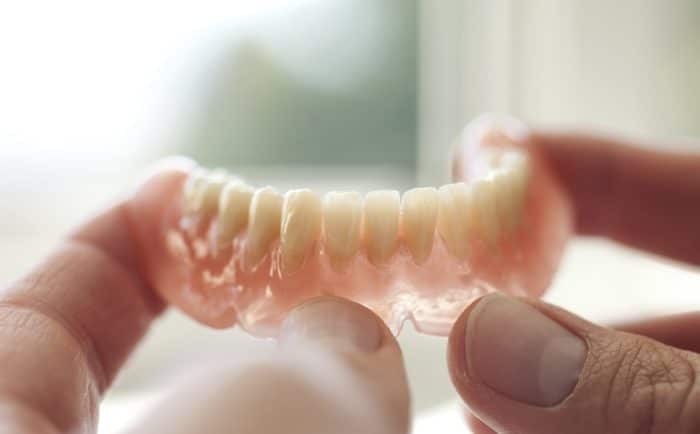10 Sep Need Dentures? 10 Most Common Questions Answered!

If your dentist or dental prosthetist has recently suggested that you need dentures, there are probably a few things you’d like to know. We’ve rounded up 10 of the most common questions to give you the facts you need.
But remember, if you still have a question, give our clinic a call; we’ll only be too happy to help.
1. Do dentures last forever?
Dentures don’t last forever; most people get four to six years out of them. However, many factors determine their longevity. Some dentures are made more carefully or with better materials than others and will last longer. Some people don’t wear their dentures regularly, so they are subject to less wear and tear and last longer.
But even if you don’t wear your dentures often, eventually, they’ll need to be relined (adapted by the dental prosthetist to improve the fit). As years pass, the fit of the denture in your mouth will decline as our gums and jawbone change shape, and won’t be able to be adjusted anymore. This happens especially when we no longer have tooth roots in our mouth (tooth roots stimulate our bone, keeping them strong and minimising bone resorption or shrinking). Because of these changes, every few years you will need a new pair of dentures created – to fit the current shape of your jaw and gums.
2. Are dentures uncomfortable?

Don’t tolerate too much discomfort, though. If your mouth is getting sore, take your dentures out and give your mouth a rest. And if you are feeling very sore, don’t suffer in silence. Get on the phone and give us a call. You may need to talk to our staff, or it may be a good idea for you to come into the clinic and see the dental prosthetist. Sometimes, your new denture may need to be adjusted slightly to improve the fit and comfort in your mouth.
3. Will it be difficult to talk while wearing dentures?
When you first start wearing dentures, it may be a little difficult to pronounce certain words, and you may feel slightly self-conscious. This should improve over time. When you’re fitted with dentures, you’ll be given some instructions and exercises to help you pronounce certain words. Many patients feel it helps to practice pronouncing words for a few minutes each day while looking in the mirror. Over time, your tongue and muscles around the mouth will become stronger and more coordinated, making speech easier.
4. Will I need denture adhesive?
In some cases where there is very little bone, your dental prosthetist may suggest you wear a denture adhesive. This is a non-toxic glue that helps your dentures stick to your gums. For some patients, denture adhesives make dentures far more stable.
5. How much are dentures?
The price of dentures varies, depending on the type of dentures you choose, their material, how lifelike you want your dentures to look (the more lifelike, the more quality materials and time required making them) and if your dentures are partial (covering just a few missing teeth) or full dentures.
The best way to find out the cost of your new dentures is to book an appointment with a dental prosthetist. He can give you an exact quote. We can then run your card through our HICAPS machine to find out exactly how much your out-of-pocket expenses will be.
6. What is a partial denture?
As the name suggests, a partial denture is a removable device created for patients who still have some remaining teeth, but require a prosthetic device to take the place of one, two or a few missing teeth. As you need fewer teeth for a partial denture, they are usually cheaper than a full denture.
7. What are immediate dentures?
Immediate dentures are the dentures that will be inserted in your mouth straight after you’ve had teeth extracted. We don’t want you leaving the clinic with no teeth in your mouth, and also immediate dentures provide other important benefits. For example, immediate dentures also act as a compression bandage, stopping the extraction site from bleeding and helping the gums and sockets to heal more quickly. Finally, they help the patient adapt to wearing dentures.
We encourage people to keep their immediate (temporary) dentures even after they receive their regular dentures as a backup for emergencies – if you happen to lose or break your regular dentures.
8. If I wear dentures, which foods can I eat?
When you first get dentures, approach eating carefully, and gradually introduce more solid/textured foods. You’ll need time and patience to develop the skills to eat with dentures. Generally speaking, you’ll need approximately 12 months to get used to your dentures and graduate to eating more challenging foods such as some meats, vegetables and raw fruit. In the early days, we recommend you stick to a diet of soft foods including scrambled eggs, yoghurt, soups, jellies, mashed vegetables, cooked stews and pasta. If you’re running out of ideas and feel tired of your dietary options, call us and ask for suggestions. We’ll only be too happy to help.
9. How do I clean my dentures?
We recommend you take your dentures out at night when sleeping to rest your gums and jaw. Your dental prosthetist will teach you how to brush your dentures with a denture brush and may recommend you soak your dentures regularly in denture cleaner.
10. Where is your denture clinic?
Dentures Direct Queensland is located at Suite 8, 15–17 Castlemaine Street, Kirwan, Townsville Queensland. We are very close to Toohey Street, Thuringowa Drive and Burnda Street. Dentures Direct caters to the people of Kirwan, those in the surrounding suburbs of Mount Louisa, Cranbrook, Condon, Vincent, Aitkenvale and Gulliver – and residents further afield in Bowen, Ayr, Cardwell, Charters Towers and Innisfail.


No Comments